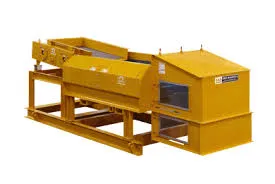

Ноя . 29, 2024 16:26 Back to list
The Importance of Municipal Solid Waste Sorting Lines
In today's rapidly urbanizing world, the management of municipal solid waste (MSW) has emerged as a critical challenge for cities across the globe. With increasing populations and consumption patterns, the amount of waste generated is escalating at an alarming rate. To tackle this issue effectively, the implementation of municipal solid waste sorting lines has become a vital solution, promoting recycling, reducing landfill use, and enhancing overall waste management efficiency.
Understanding Municipal Solid Waste Sorting Lines
A municipal solid waste sorting line is a systematic setup designed to separate different types of waste materials. This process involves the segregation of recyclable materials, organic waste, hazardous waste, and non-recyclable waste. The sorting lines commonly utilize various technologies, including conveyor belts, shredders, and advanced sorting machines, which employ methods such as air classification, magnetic separation, and optical sorting to accurately differentiate waste streams.
The Significance of Waste Sorting
The benefits of effective waste sorting are manifold. Firstly, it leads to an increased recycling rate. By specifically sorting recyclable materials like plastics, metals, and glass, these resources can be reintroduced into the supply chain, reducing the demand for virgin materials. This not only conserves natural resources but also lowers greenhouse gas emissions associated with manufacturing processes.
Secondly, sorting organic waste plays a crucial role in waste management strategies. Organic materials, when properly sorted, can be processed through composting or anaerobic digestion, converting waste into valuable products such as compost or biogas. This approach not only mitigates landfill waste but also promotes sustainable agricultural practices by returning nutrients to the soil.
Furthermore, sorting lines help in the identification and proper disposal of hazardous materials, such as batteries, electronic waste, and chemicals. Improper handling of these substances can pose severe environmental and public health risks. By effectively segregating these materials, municipalities can ensure their safe treatment and disposal.

Challenges in Implementing Sorting Lines
While the benefits of municipal solid waste sorting lines are evident, there are also challenges associated with their implementation. One major obstacle is the initial investment required for setting up sorting facilities and acquiring advanced technology. Many municipalities, especially in developing countries, may lack the financial resources or technological expertise needed to establish efficient sorting systems.
Additionally, public participation and awareness are crucial for the success of waste sorting initiatives. Citizens must be educated about the importance of sorting their waste at the source, as the effectiveness of sorting lines largely depends on how well the residents separate their waste. Engaging communities through educational campaigns and incentive programs can enhance participation rates.
The Future of Municipal Solid Waste Sorting
As urban areas continue to grow, the future of waste management will increasingly rely on advanced sorting technologies. Innovations such as artificial intelligence and machine learning are beginning to play a role in enhancing the efficiency of sorting lines. These technologies can analyze waste streams in real-time, improving the accuracy of material identification and increasing the overall throughput of sorting facilities.
Moreover, collaboration among various stakeholders—governments, businesses, and the public—will be essential in creating a sustainable waste management ecosystem. Policies that promote recycling, enforce waste segregation, and support the development of sorting facilities will pave the way for effective waste management practices.
Conclusion
Municipal solid waste sorting lines are indispensable in addressing the growing waste crisis in urban areas. By increasing recycling rates, facilitating organic waste processing, and ensuring the safe disposal of hazardous materials, these systems contribute significantly to environmental sustainability and public health. Investing in advanced sorting technologies and fostering community engagement will be crucial as cities navigate the complexities of modern waste management. The path toward a cleaner, more sustainable future begins with effective waste sorting and management practices.
Latest news
The Future of Metal Recycling: Revolutionizing Waste Management
NewsMay.14,2025
Optimizing Waste with Recycling Lines
NewsMay.14,2025
Municipal Solid Waste Sorting Line: Revolutionizing Waste Management
NewsMay.14,2025
Metal Shredders: Essential Tools for Efficient Recycling
NewsMay.14,2025
Maximize Your Profits with a Copper Wire Granulator
NewsMay.14,2025
Home Metal Shredder: A Smart Choice for Your Home Recycling Needs
NewsMay.14,2025